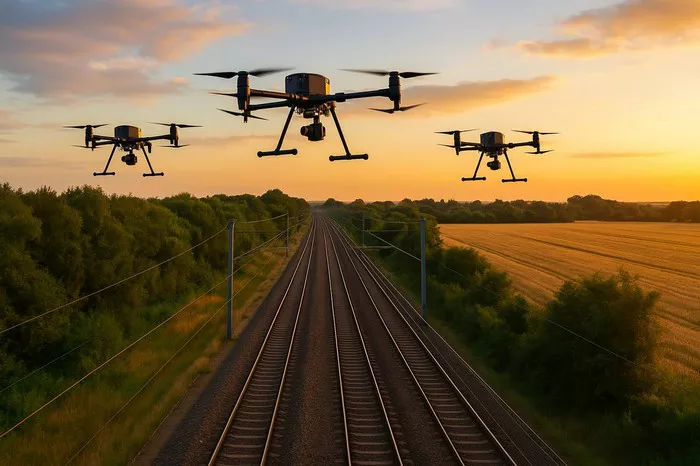The UK’s Civil Aviation Authority (CAA) has granted operational approval to Drone Major, allowing the company to conduct beyond visual line of sight (BVLOS) drone flights over the nation’s critical infrastructure. This marks the first time long-distance drone operations are permitted in non-segregated airspace over such sensitive areas in the UK.
Initially, the approval will enable Drone Major to deploy long-range drones to patrol railway networks, providing real-time detection and monitoring of trespassers. The technology aims to enhance safety, increase efficiency, and reduce delays on UK railways.
Funded and facilitated by Network Rail, the initiative will trial the drone system along a 7.5-mile (12 km) route between Wolverhampton and Sandwell & Dudley Station. Earlier tests of Drone Major’s technology have taken place along the rail corridor southeast of Wolverhampton station and the Severn Valley Railway lines.
Drone Major’s system, using its proprietary Digital Tethering technology, ensures safe and controlled drone flights within a defined safety corridor. This method integrates onboard navigation and safety mechanisms with ground-based support to provide autonomous flight and precise real-time positioning, especially where GPS signals are weak or unavailable.
“The Civil Aviation Authority’s support for BVLOS operations represents a significant step toward making safe and routine drone flights a reality,” said Sophie O’Sullivan, Director of Future of Flight at the CAA. She emphasized that such projects are key to modernizing UK airspace and fostering innovation in drone technology.
The approval opens the door to expanding BVLOS drone operations across other critical sectors including energy, utilities, defense, border management, and infrastructure surveillance. Drone Major plans to continue trials with additional infrastructure organizations, setting a new standard for safety and efficiency while positioning the UK as a leader in drone innovation.
Robert Garbett, founder and CEO of Drone Major Group, hailed the approval as a “landmark moment” for the drone industry, highlighting its potential to transform monitoring and maintenance of critical national assets, especially in densely built environments where conventional methods face limitations.
The CAA remains committed to supporting a range of drone projects—from infrastructure inspections to consumer deliveries—to gather insights that will shape future drone regulations and support the sector’s growth.
Related topics:

